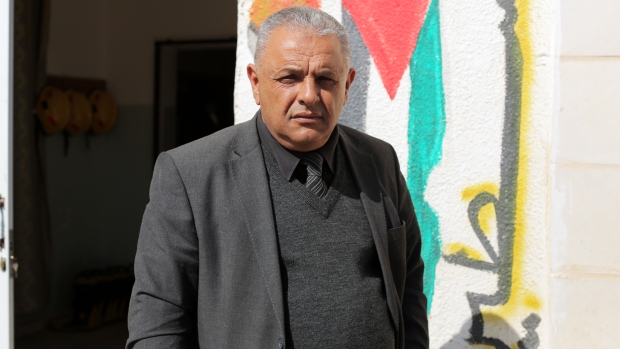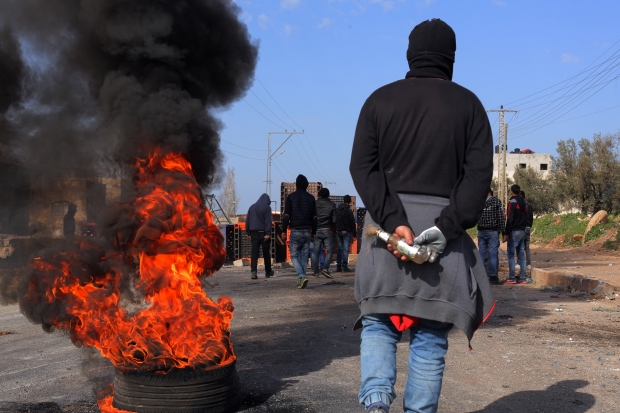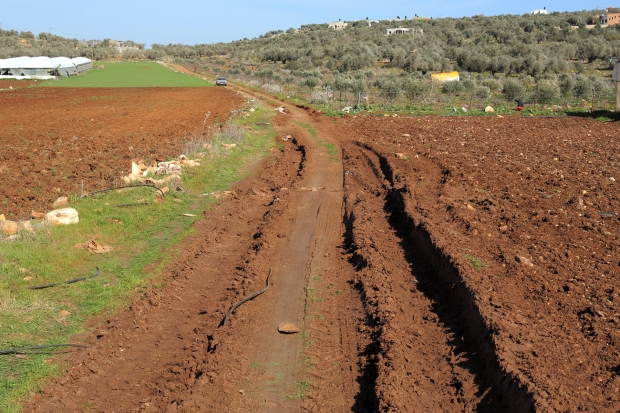Palestinian mayor: Israel punishing 25,000 people for the actions of three

QABATIYA, West Bank - It is the only way into Qabatiya, but it can hardly be considered a road. The dirt route runs through a farm field with deep trenches cut into the ground where ambulances have torn through the soft earth, as first responders try desperately to get the wounded out of the village.
Qabatiya is big for something called a village. It is home to about 25,000 Palestinians in the northern West Bank district of Jenin.
The seven real entrances have all been blocked off with large mounds of dirt dug from the village's land.
Israeli forces closed off Qabatiya overnight on Wednesday, after three youths made their way from the village, crossed into Israel illegally, and shot dead a 19-year-old Israeli police officer in occupied East Jerusalem.
All three Palestinians were shot dead at the scene.
An Israeli army spokesman told Middle East Eye that the village would remain closed for at least a month, and would be reopened only after it had passed a "situation assessment".
The village's mayor, Mahmoud Kameel, who shares his last name with almost half its residents, said he believed Israel's actions were unconscionable and amounted to collective punishment.
"Punishing 25,000 people because of the actions of three teenage boys - in what country is that okay?" Kameel said.
"In what way does that make any sense?
"These people didn't do anything, but they are here stuck in their homes, not able to work, not able to live because Israel has chosen to punish tens of thousands for the actions of three boys."
Sari Bashi, a spokeswoman for Human Rights Watch, told MEE that it was not necessarily unlawful to close the entrance to a village for a short time, for example to arrest a suspect.
However, "if the closure were to continue it would risk being disproportionate, or even a measure imposed for reasons for collective punishment".
Israeli authorities have previously said that closing Palestinian villages deters attacks. Kameel, however, said making the situation worse for the population as a whole does the exact opposite.
Ahmad Mohammed Kameel, the father of one of the three teenagers in the Jerusalem attack, told MEE that he agreed with the mayor's sentiment. His son was not political, he said, but the pressure of the current upheaval could have been a breaking point and the trigger to "fighting the occupation".
Ahmad did not condemn his son's actions, saying that any Palestinian would be honoured to have a "martyr" in their family, much like "other countries supporting their fallen soldiers". But the loss of his son still weighs heavy.
"I am just thankful for the support of my village," Ahmad said. "Everyone knows they are going through this together because of my son and his friends, but no one sees it that way."
"It is not fair for them though, thousands of people suffering like this because of some teenagers. I can be held responsible as Mohammed's father, sure, but thousands of people? No."
Israeli forces have issued home demolition notices to Ahmad and the families of the two other teenagers involved in the attack.
"I won't accept that is right for Israel to destroy my family's home, but it is just a home, in the end my son is so much more important, I can't think about a house right now," Ahmad said.
Israeli rights group BTselem was not able to immediately provide a statement on the events in Qabatiya, but referred MEE to their numerous reports on punitive home demolitions.
According to the group, Israel's defence minister in 2005 found that punitive home demolitions were an unsuccessful deterrent for attacks.
The policy, he said "may in fact have an opposite effect".
After the findings, punitive home demolitions ceased for 10 years, until Israeli Prime Minister Benjamin Netanyahu called for their re-imposition last October.
Since then, BTselem has documented at least 29 punitive demolitions carried out by Israeli forces, three of which were in January and left 18 people homeless.
While Ahmad is sure his home will be destroyed, the youths of the village have vowed not to allow the demolition to happen without a fight.
All the roads leading the Ahmad's home are guarded by youths armed with rocks and petrol bombs. Tyres burn in the streets - smoke shields guarding against Israeli fire.
Palestinian news agency Maan News reported four injuries caused by live fire during clashes in the village on Thursday, while MEE witnessed at least one other during clashes on Friday.
The population of young people is spread thin on the streets, with around 80 teens at every "hotspot" in the village where youths and Israeli forces come head to head.
Protesters piled large plastic crates in the road as cover at one of the main entrances where the largest clashes take place.
The crates are made to store vegetables at the wholesale market across the street.
The market, usually a bustling hub for grocers and farmers from across the northern West Bank, is now empty save for a few dozen large crates of rotting veg.
Bilal Kamil, one of at least 50 wholesalers who would normally be working at the market, came to his shop to calculate how much money he has lost during the past three days.
"I own one of the smaller places here at the market, and I sell about 10,000 shekels [$2,576] a day of produce," Kamil said.
"I was able to store some of it in a refrigerator, which is what everyone is trying to do, but we aren't a grocery store here, we have crates and crates of vegetables we sell to grocery stores. It is all going to rot if this keeps up."
Kamil said a lot of his vegetables were already unsellable. On Friday morning he couldn't sell a small crate of courgettes for half their usual 70 shekels ($18), because the produce had gone soft in the sun.
He said grocery stores and shoppers across the northern West Bank would suffer from the village's closure.
"Supply is going to go down and costs are going to skyrocket. Today people just stopped harvesting some of the vegetables because it's better that they stay in the ground. They may last longer that way."
Kamil said he did not blame the three Palestinian youths for his lost income.
"This is Israel's doing, this is Israel's choice to take out their aggression on my entire village, on the whole of the Palestinian people for the acts of a few."
Later on Friday, Maan reported that Israel was renewing the "closed military zone" status of the Tel Rumeida neighbourhood in the Old City of Hebron in the southern West Bank.
The neighbourhood has been declared a "closed military zone" since 1 November, with Israeli forces preventing both Palestinians and foreigners from entering and exiting, the Maan report said.
There are over 550,000 Israeli settlers living in the occupied West Bank, in contravention of international law. Around 500 of them live in the heart of the Palestinian city of Hebron amid a heavy Israeli military presence.
MEE staff contributed to this report.
Stay informed with MEE's newsletters
Sign up to get the latest alerts, insights and analysis, starting with Turkey Unpacked
Middle East Eye delivers independent and unrivalled coverage and analysis of the Middle East, North Africa and beyond. To learn more about republishing this content and the associated fees, please fill out this form. More about MEE can be found here.









